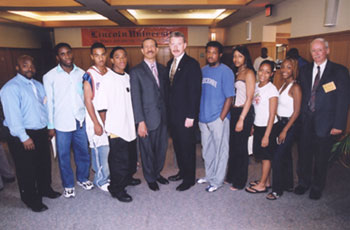- Posted in All University
- Category: Campus News
 High school juniors and seniors at the kickoff of Lincoln University’s Environmental Science Program on June 29.
High school juniors and seniors at the kickoff of Lincoln University’s Environmental Science Program on June 29.
Program organizers include from left: Dr. Derrick Swinton, associate director, Environmental Science Program; Dr. Grant D. Venerable II, vice president, Academic Affairs; Donald S. Welsh, regional administrator, Environmental Protection Agency (EPA), Region III; and Dr. David F. Royer, chair, Biology Department.
WHO:
Dr. Grant D. Venerable II, Vice President of Academic Affairs
Lincoln University
Dr. David F. Royer, Chairman, Biology Department
Lincoln University
Dr. Derrick J. Swinton, Associate Director, Environmental Science Program
Lincoln University
Donald S. Welsh, Regional Administrator
U.S. Environmental Protection Agency, Region III
WHAT:
Lincoln University presents opening ceremony for its four-week, residential Summer Environmental Science Program for high school juniors and seniors. The program, which will operate between June 29 and July 26, is designed to stimulate greater interest in environmental science and to encourage students to pursue careers in the environmental field.
WHEN:
Sunday, June 29, 2003 • 3:00 p.m. – 4:00 p.m.
WHERE:
On the campus of Lincoln University, Marshall Living Learning Center
1570 Baltimore Pike, Lincoln University (southern Chester County), PA
BACKGROUND:
On June 7, 2002, U.S. Environmental Protection Agency (EPA) Administrator Christie Whitman announced an environmental educational partnership between Lincoln University, Philadelphia Academies, Inc., a non-profit educational organization, and the EPA.
The EPA is providing a $50,000 grant to Lincoln to help fund the summer program. This is the first federal environmental education partnership developed to respond to the No Child Be Left Behind Act of 2001. The law increases support for educating American youth and expanding higher education opportunities — particularly for students from minority and disadvantaged backgrounds — and especially those at Historically Black Colleges and Universities.
Founded in 1854, Lincoln University provides the best elements of a liberal arts and sciences-based undergraduate core curriculum and selected graduate programs to meet the needs of students living in a highly technological and global society. Lincoln is nationally recognized as a major producer of graduates with baccalaureate degrees in the physical sciences — biology, chemistry, and physics.